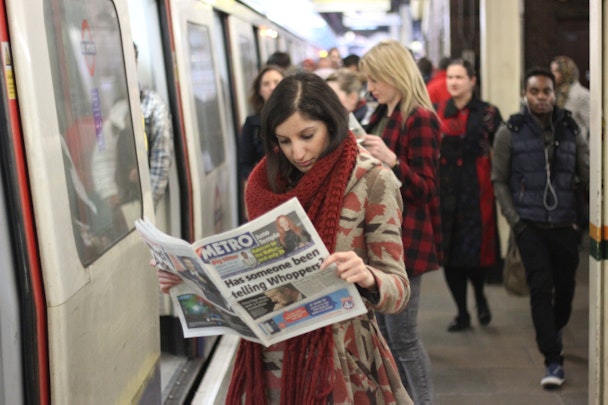Metro recalibrates commercial arm to show that ‘free print’ isn’t struggling like paid-for newspapers
Freesheet Metro has restructured its commercial arm to better articulate its message that while other publishers may be struggling to make money, the paper’s cut-through with a younger audience puts it in good health.

Metro
While a restructure amid the current media landscape usually suggests tough times for publishers, the freesheet is adamant that there’s a more positive reason behind its own overhaul. “We haven't done it to save money, we have just reconfigured the teams to effectively sell to our clients,” Metro’s trading director Grant Woodthorpe told The Drum.
Its 14-strong commercial team will now consist of eight strategic sales managers with blended skills who will have smaller patches in order to work closely with media agencies and brands. Where before it would have two people looking after four or five agencies, now it takes a more one-on-one structure. The new team will be managed by head of agency, Jo Mazenko, and head of client, Tracy Stanton.
The trading team will reduce from six people to three as part of this restructure, to be led by trading manager Patrick Kinnear. The “cost-neutral” reconfiguration is intended to allow the teams to effectively sell to Metro’s clients and better service the agencies it works with.
Metro hopes the reorganised commercial structure will allow greater visibility within the marketplace, recognising this is something the paper needs to address, with Metro’s creative director Sophie Robinson saying: "Because we are a small team visibility is a problem for us and is still a problem for us because there are loads of other media owners out with the agencies all the time."
"We want to be more visible so by removing the divisions it means those guys can be out with their agencies all the time" Robinson added.
The new structure will be split into two units – a proactive creative strategy unit and a reactive creative strategy unit. The reactive side of the business, which is tasked with amplifying a client’s idea, will not change according to Metro. The proactive side will work closely with the editorial team to convince partners to sponsor Metro’s mini brands and establish long-term content partnerships. It’s part of Metro’s move to a more unified business, using commercial partners to help make its own brands bigger.
The restructure will also see increased collaboration with other media owners, something Metro has always been “fairly open to” according to Woodthorpe, not just within its own stable with MailOnline and the Mail but with media owners outside the DMG Media group.
It comes at a time when publishers with paid-for newspapers are being forced to try alternative strategies in order to adapt their print business models. Regional newspaper publisher Archant this week announced it will launch a ‘pop-up’ pro-Europe newspaper, a short-term venture to tap into a current topic while it is still relevant. It is part of the publisher’s live market research to test a longer term plan that could see it open up additional revenue streams by launching timely titles.
It is one of a number of moves by publishers to safeguard themselves from print declines, but Metro is keen to assert that freesheets are largely untouched by such concerns since it reaches a very different audience and is not confined to circulation limits.
“We control circulation so if we want to increase circulation we can do where paid-for newspapers struggle with that,” Woodthorpe said.
While year-on-year Metro has reported declines in print advertising sales, “they aren’t at the same extent of paid-for newspapers” according to Robinson. In the six months to 31 March, Metro delivered a relatively robust performance in the context of the weak UK print advertising market, with revenues declining by 7 per cent to £36m. That said, the business knows it is not immune to the aggressive declines in the print ad industry this year, and admits it has been impacted by 'printism' in the industry.
“We have only been impacted because of agencies thinking there are problems in print, so we have to change ourselves to make people realise that actually Metro is doing really well.” Robinson said.
This latest move is testament to how the paper is carefully managing its cost base to defend its profitability, creating a more holistic service to keep advertisers keen. It’s why the paper has managed to increase its partnerships with brands despite declines in ad sales, with Robinson saying: “Our editor sees brands as much as opportunities so that is why we do well in partnerships. If a brand has got the same agenda as I have for my readers then we want to work with them.”

